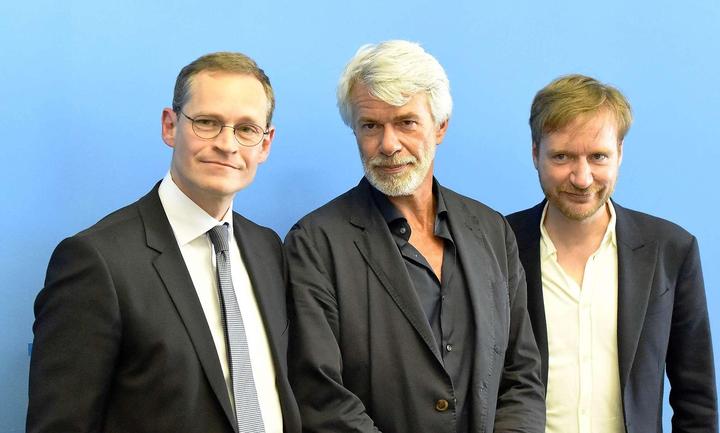Politics
Employees at Berlin’s Volksbühne Theater Protest Chris Dercon’s Appointment
They called Dercon's plans for the house "banal" and "a threat."

They called Dercon's plans for the house "banal" and "a threat."

Hili Perlson


Volksbühne, Berlin. Courtesy Wikimedia Commons.
On Monday, June 20, some 172 actors, designers, dramaturges, and theater employees affiliated with Berlin’s Volksbühne penned an open letter to the city senate and German culture minister Monika Grütters expressing their “deep concern” over the approaching change of directors at the storied institution, which will soon be headed by outgoing Tate Modern director Chris Dercon.
Dercon was appointed by Berlin’s culture senator Tim Renner to replace current theater director, Frank Castorf, who has been at the helm of the theater for almost 25 years. Renner, a former music producer, has made no secret of his disapproval of Castorf’s long-term reign at the Volksbühne (which is bankrolled by the senate, like all state-funded theaters in Germany) and has hinted prior to Dercon’s appointment that the theater must be “rethought.”
When Dercon’s new role was announced back in April 2015, it was greeted with significant skepticism. Die Zeit reported that several high-profile theater directors were concerned that Dercon’s appointment could transform the historic Volksbühne into a “festival house.”

Berlin Mayor Michael Müller, Chris Dercon, and Berlin Culture Minister Tim Renner announced Dercon’s appointment at a news conference in Berlin on April 24, 2015. Courtesy of Tobias Schwarz/AFP/Getty Images.
Now, it is the house’s own employees and long-time affiliates who are protesting Dercon’s looming takeover. “It is with concern that we face the change of directors at the Volksbühne in the coming year,” the letter, translated from German by artnet News, reads.
“We are not afraid of the new,” the signatories stress, but point out that following a general assembly with the future management that took place in April, they felt that “there will be no new forms and artistic challenges at the Volksbühne. A conceptual line of artistic and structural development of our theater is not apparent in the remarks Chris Dercon and his program director Marietta Piekenbrock have made.”
What follows in the open letter is a scathing break-down of the ambiguous language used at the meeting to describe what the future holds for the historic house. Signatories seem particularly angered by the suggestion that “introducing” multi-disciplinary practices to the stage would represent a “novelty,” as the theater is considered one of Berlin’s most experimental and avant-garde since its inception over 100 years ago.
“In the banality of [their] promulgation we fear the sellout of our own artistic standards and a weakening of our potent drama theater operation,” they write:
This is not a friendly takeover. It is an irreversible turning point and a break in the recent history of the theater. This change represents historical leveling and razing of identity. The artistic processing of social conflict is displaced in favor of a globally extended consensus culture with uniform presentation and sales patterns. We miss in the conceptual designs of the future director everything that makes this theater unique: politically engaged art, a specific theater concept, a steady repertoire and ensemble, and a vision for the unique potential of the house’s own workshops. We fear that in view of these plans, our skills and capacities are not needed. We fear job cuts, up to the negation of entire trades. … a weakening of the existing potential will lead to a weakening of the Volksbühne; once these are destroyed, they will be permanently lost. This could have a devastating ripple effect on the entire German city theater landscape.
The signatories specify that the letter is not directed at Dercon himself, but rather at the decision makers: “Our criticism is directed at the Berlin’s cultural policy: in the name of an alleged internationalization it is working hard to destroy the originality and diversity with which the Volksbühne is associated. We see this as a threat to the future of the theater!”
They conclude their appeal with a clear demand, asking the senate of Berlin to “examine the concept of the new management team of the Volksbühne in regards to the concern formulated by us.”
With so much resistance from within his own future team, it remains to be seen what changes Dercon will able to implement after he takes up the position next year.